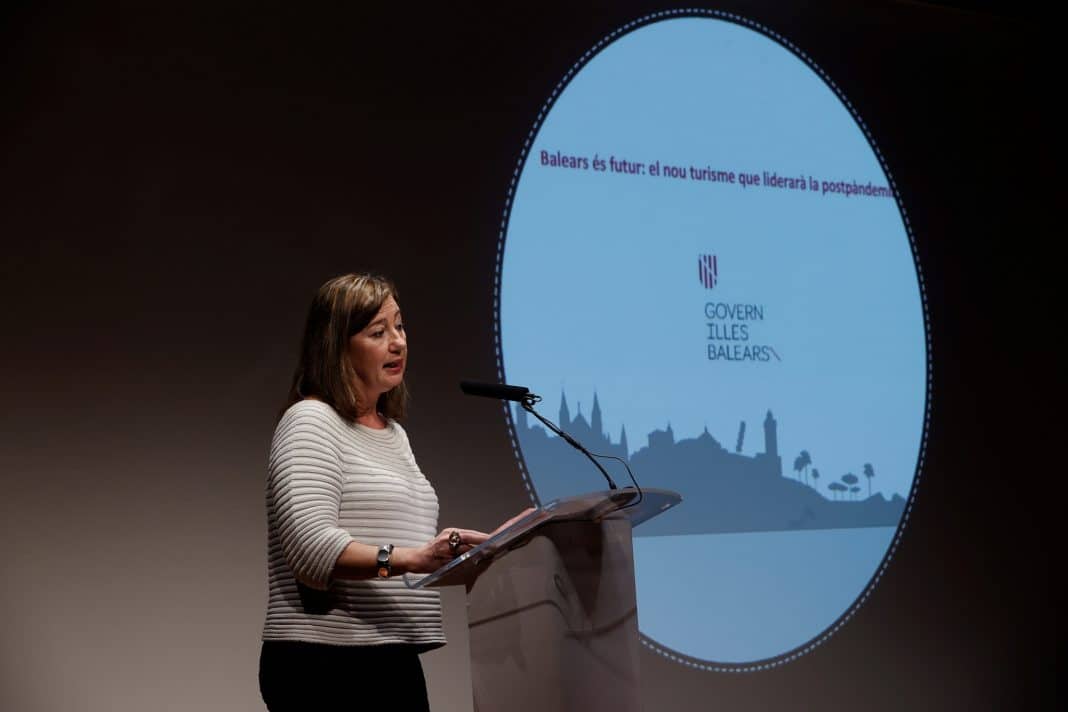The Balearic Islands is nearing completion of a tourism law overhaul that will mark a before and after for the archipelago’s economic powerhouse. The president of the Government, Francina Armengol, called yesterday’s presentation event at the Reina Sofia Museum in Madrid of a new legal framework that will involve far-reaching changes in the sector’s labor, environmental, and social aspects as a “historic shift.” The majority of the measures affecting the hotel industry have been introduced by the President of the Autonomous Executive, who highlighted that they are the result of “months of work” with companies and trade unions.
When the new regulation is approved, which will include a central government investment of 55 million euros, the category of hotels will be linked to the implementation of measures to ensure the occupational health of their workers, reduce their water and energy consumption, bet on local products, and establish traceability of fish and seafood to verify its origin. “We don’t want to go back to 2019, but rather to a brighter future in terms of competitiveness, equality, and rights,” Armengol explained. The new framework is expected to be adopted “immediately.”
“Hotels will be required to construct elevating beds, either mechanical or electric, beginning in 2023 in order to reduce the pathologies of the twenty thousand kellys (floor maids) who work on the islands. Overexertion is responsible for 29.8% of accidents in the industry and 35% of those sustained by chambermaids, which will be decreased thanks to the replacement of 300,000 beds in the islands over the next six years. Starting with the higher-end hotels, four and five stars.
“They will receive assistance from European funds as a result of the government’s cooperation”, said the President of the Government during a Fitur ceremony attended by the Labor Minister, Yolanda Diaz, the Tourism Minister, Reyes Maroto, the state leaders of the CCOO and UGT unions, Unai Sordo and Pepe Alvarez, respectively, and the main representatives of the islands’ tourism sector.
The new legal frameworkfor the Balearic Islands will be adopted “immediately” and will apply to the whole tourism industry
In a nutshell, the goal of this transition is to turn tourism from a social and environmental issue into a solution. “The Balearic Islands will be the first circular destination in the world. A formula that will deliver answers to rejuvenate the environment while also increasing company profitability,” Armengol claimed. In this regard, the president stated that “the category of hotel businesses would be connected to waste reduction and the use of scarce resources like as water and energy.”
As a result, each hotel will be required to implement a circularity plan, which will begin with registering its energy use. “They will need to assess their current status and measure the waste they produce, the gases they emit, and the energy and water they use. In addition, they will offer a five-year action plan outlining how they will cut their consumption, generate less waste, and recycle more. They will then have to comply with it” Armengol stressed.
In this regard, the new laws would compel hotels to replace fuel oil boilers with electric or natural gas boilers, as “they are the main source of emissions in the hotel sector,” according to the Executive Director. “With this solution alone, emissions will be decreased by 57,600 kilograms of CO2 per hotel per year,” she calculated. “Some establishments have already begun to adapt to consume green hydrogen, a clean energy source created on our islands,” Armengol said.
There will also be additional standards in place to try to reduce the excessive water use recorded by the hotel plant, particularly during peak season. Establishments will be required to install pressure limiters in bathrooms and sinks, double push-button systems in toilet cisterns, and use rainwater with the assistance of public funds.
Bye-bye single-use amenities in the Balearic Islands
In terms of trash, single-use amenities (small-format personal hygiene products such as shampoo or toothpaste) will be removed from rooms, and paper will be replaced with QR codes.
Another cornerstone of this strategy will be a commitment to local food consumption, preferring local products, and prohibiting the use of endangered animals. Similarly, the traceability of Balearic-origin fish and seafood sold in hotels will be made necessary – for the time being, this does not apply to meat and vegetables.
Similarly, hotels will phase out obsolete quality criteria such as a telephone in the toilet or a desktop computer in a five-star room. Measures already in place in high-tourism zones, such as the deletion of self-service alcohol dispensers, will be expanded to all hotels.
For the full article, please visit Diario de Ibiza website here.

